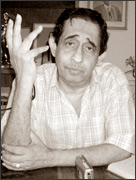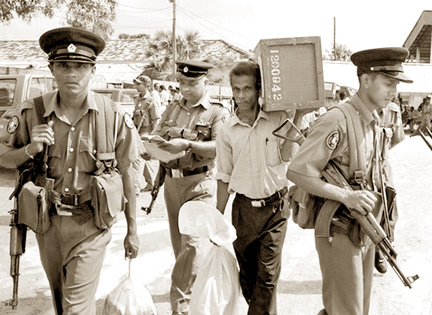Redemarcating electoral boundaries
Ravi LADDUWAHETTY
Compiled from an interview with Constitutional
Lawyer and Colombo University Constitutional Law lecturer Dr Jayatissa
De Costa
|

Dr Jayatissa De Costa
|
 The
32- Member Parliamentary Select Committee on Electoral Reforms chaired
by Mahajana Eksath Peramuna Leader, Chief Government Whip and Minister
of Urban Development Dinesh Gunawardena has specified that Articles 95
to 99 of the Constitution have to be amended to establish the
Delimitation Commission for redemarcating the electoral boundaries. The
32- Member Parliamentary Select Committee on Electoral Reforms chaired
by Mahajana Eksath Peramuna Leader, Chief Government Whip and Minister
of Urban Development Dinesh Gunawardena has specified that Articles 95
to 99 of the Constitution have to be amended to establish the
Delimitation Commission for redemarcating the electoral boundaries.
Former Attorney General C.R. De Silva also been quoted in the PSC
report as having said that the Delimitation Commission should stand
perpetually. The articles of the Second Republican Constitution which
stand as what they are today are as follows and the need for amendments
is as follows:
Article 95:
(1) of the Constitution specifically states... “Within three months
of the commencement of the Constitution the President shall for the
delimitation of electoral districts establish a Delimitation Commission
consisting of three person appointed by him, whom he is satisfied are
not actively engaged in polities. The President shall appoint one of
such persons of the Chairman.
|
Factors which also have to be
considered when redemarcating the electorates will be rural and
backward electorates. Weightage will also have to be given to
Multi Ethnic Constituencies, the geographical area and other
demographic trends. |
(2) If any member of the Delimitation Commission shall die, resign or
if the President is satisfied that any such member has become incapable
of discharging his function as such, the President shall, in accordance
with the provisions of paragraph (1) of this Article, appoint another
person in his place.
The reason for the demarcation of the electoral boundaries and the
need for the Amendments from Articles 95 to 99 of the Constitution, is
due to the allocations of the 140 seats of Parliament on the basis of
the First Past the Post system and a further 70 seats on the
Proportional Representation system which is a part of the proposed
electoral reform system.
Accordingly, there will be 140 new electoral boundaries which have to
be established from the present 160 which is a part of the new 1978
Second Republican Constitution enacted by former President J.R.
Jayewardene in 1978. So, the electoral boundaries have to be
redemarcated and a fresh Delimitation Commission is necessary.
There are special provisions in the Constitution which have been laid
in respect of the Delimitation Commission and that had been deemed
necessary in 1978 for the new Constitution which had 168 Members of
Parliament comprising 160 MPs based on the First Past the Post System in
the single Constituencies and a further 8 MPs on the Multi Member
Constituencies.
According to the present Constitution, the total number of MPs is the
House is 225 comprising 168 elected MPs ( which is 160 polling divisions
from the single member constituencies and a further eight from the Multi
Member Constituencies) 28 based on the District Proportional
Representation and another 29 on the National List.
President Jayewardene under the 1978 Constitution amended the first
Republican Constitution of Prime Minister Sirimavo Bandaranaike of 1972.
He also brought in the three members Delimitation Commission which was
chaired by retired Chief Justice GP De Silva. It was this delimitation
Commission which decided on these amendments then.
There are other reasons also for justifying the demarcation of
electoral boundaries. For instance, there is a remarkable reduction in
the vote bases such as the Colombo West and East electorates but instead
remarkable increases in the number of voters in electorates such as
Kaduwela which has risen to 130,000. So, under the present electoral
boundaries it will also be very difficult for a candidate of the Colombo
West of East to win his seat without other supporting votes from the
rest of the electorates in the District, which is possible under the
present District system and not possible under the First Past the Post
system.
Other factors which also have to be considered when redemarcating the
electorates will be rural and backward electorates. Weightage will also
have to be given to Multi Ethnic Constituencies, the geographical area
and other demographic trends. However, the salient feature is that these
proposals have to be implemented expeditiously in the event of the
Select Committee being sincere about the reforms as this is October 2008
and with less than two years more for the next Parliamentary elections
billed to be held in April 2010.
Under Articles 96, it states:
(1) The Delimitation Commission shall divide Sri Lanka into not less
than twenty and not more than twenty - five electoral districts, and
shall assign Names, thereto.
(2) Each Province of Sri Lanka may itself constitute an electoral
district or may be divided into two more electoral districts.
(3) Where a Province is divided into a number of electoral districts
the Delimitation shall have regard to the existing administrative
districts so as to ensure as far as is practicable that each electoral
district shall be an administrative district.
(4) The electoral districts of each Province shall together be
entitled to return four members (independently of the number of members
which they are entitled to return by reference to the number of electors
whose names appear in the registers of electros of such electoral
districts), and the Delimitation Commission shall apparition such
entitlement equitably among such electoral districts.
(5) In the event of a difference of opinion among the members of the
Delimitation Commission, the opinion of the majority thereof shall
prevail and shall be deemed to be the decision of the commission. Where
each member of the Commission is of a different opinion, the opinion of
the Chairman shall be deemed to be the decision of the Commission. Any
dissentient member may state his reasons for such dissent.
(6) The Chairman of the Delimitation Commission shall communicate the
decisions of the Commission together with the reasons if any, stated by
a dissentient member to the President.
The then Delimitation Commission chaired by retired Chief Justice G.P.
De Silva, and according to the powers vested in it to form and divide
Sri Lanka into not less than twenty and not more than twenty five
electoral districts, had the following classifications and had a total
number of twenty two electoral districts.
They are: Western Province: Colombo, Gampaha and Kalutara. Central
Province: Kandy, Matale and Nuwara Eliya. Southern Province: Galle,
Matara and Hambantota. Uva Province: Badulla and Moneragala. North
Central Province: Anuradhapura and Polonnaruwa. North Western Province:
Kurunegala and Puttalam. Sabaragamuwa Province: Ratnapura and Kegalle.
Northern Province: Jaffna and Wanni. Eastern Province: Trincomalee,
Batticaloa and Digamadulla
It was the then Delimitation Commission which had changed the
previous electoral boundaries to the ones standing today. Under the
existing delimitation, there is the Digamadulla District which is a
consolidation of the Ampara, Samanturai, Kalmunai and Pottuvil
electorates while the Wanni District is the amalgamation of the
Mullaitivu, Mannar and Vavuniya electorates. The then Delimitation
Commission ceased to exist once the mandate of the Commission was over.
However, the need for change is for the fresh delimitation where the
number of Mps have reduced from 160 to 140
It is also moot to note that all these Constitutional Amendments need
two thirds majority in Parliament and it is obligatory that all major
political parties represented in Parliament vote for the passing of
these electoral reforms without division providing two thirds majority
for them to legalise it. Judging by the unanimity of the 32- Member
Select Committee this should not be seen as a problem. It is also
important that the electoral boundaries are redemarcated due to
demographic reasons. Under the present electoral boundaries, there are a
series of deficiencies in accommodating the proposed reforms:
Article 97 Article 97 of the Constitution states: “ The President
shall by Proclamation publish the names and boundaries of the electoral
districts and the number of members, which each such electoral districts
is entitled to rerun by virtue of the provisions of paragraph (4) of
Article 96 in accordance with the decision of the Delimitation
Commission. The electoral districts specified in the Proclamation shall
come into operation at the next ensuing General Election of Members of
Parliament and shall thereafter be the electoral districts of Sri Lanka
for all the purposes of the Constitution and of any law for the time
being in force relating to the election if Members of Parliament.” This
will mean that some of the names in the electoral boundaries and their
numbers will have to be eliminated. That also means that some of the 160
polling divisions now will have to be eliminated as the number has to be
reduced to 140.
Article 98 Article 98
(1) states: The several electoral districts shall together be
entitled to return one hundred and ninety - six members.
(2) The apportionment of the number of members that each electoral
districts shall be entitled to return shall, in the case of thirty - six
members, be determines in accordance with provisions of paragraph (4) of
Article 96.
(3) The appointment of the number of members that each electoral
district shall be entitled to return out of the balance number of one
hundred and sixty - members shall be determined in accordance with the
succeeding provisions of this Article.
(4)The total number of electors whose name appears in the registers
of electors of all the electoral districts shall be divided by one
hundred and sixty. The whole number resulting form such division (any
fraction not being taken into account) is hereinafter referred to as the
“qualifying number.”
This will also mean that Article 98 will also have to be amended as
the future elections will not be held under District system but instead
under the First Past the Post system where 140 members will be elected
and a further 70 under the District Proportional system which will
allocate 70 such Members. Article 99A Article 99A states: After the one
hundred and ninety six members referred to in Article 98 have been
declared at a General Election of Members of Parliament, the Election
Commission shall for forthwith apportion the balance twenty nine seats
among the recognized political parties and independent groups contesting
such General-Election bears to the total number of votes polled by each
party or group at such General Election bears to the total number of
votes polled at such General Election and for the purpose of such
apportionment, the provisions of paragraphs (4), (5), (6) and (7) of
Article 98 shall, mutatis mutandis, ( with the necessary changes) apply.
However, under the present system the breakdown of the 225 MPs should
be 160 Members based on the 160 polling divisions despite contesting
under the District system, a further 28 based on the District PR and the
final 29 on the National List to make the 225.
However, with the return to the FPP system, Amendments to this
Article will also have to be made to increase the District PR members
from the present 28 to the envisaged 70 which will also mean that not
only the changes will have to be done to the numbers of the DPR members
but also to the electoral boundaries.
Overall, there should not be a constraint obtaining the requisite two
thirds majority for the Constitutional Amendments to make the necessary
changes for the implementation of the electoral reforms as a majority of
the members of the Select Committee have approved the reforms and are in
consonance for the need for changes.
Dr Jayatissa De Costa holds a Colombo University Bachelor of Laws
Degree, a London University Master of Laws Degree and a Colombo
University Doctorate in Comparative Constitutional Law, Family Law,
Criminology and Principles of Litigation. |

